Why Am I So Hungry All The Time?
Why am I so hungry all the time? Have you ever asked yourself that question? Sometimes it’s real hunger and we need to eat but other times we are ravenous just 30 minutes after eating! What’s up? Today we’re taking a look at hunger, what causes it and what we can do to manage it.

It’s crazy, right? You just ate a huge meal and an hour later, you’re starving. What gives? Why am I so hungry all the time?! You might feel like you’re always hungry, or maybe you’re not hungry at all until you eat, and then you’re ravenous, or maybe y0u just ate a huge meal, feeling totally stuffed, only to be hungry again shortly after. Your hunger is always there and often in charge of your whole day.
Your Hunger Isn’t In Charge
I’ve been there, guys. My hunger used to be in charge, big time. The slightest sensation of hunger and I was in a panic that I needed to eat and I needed to eat now. I’ve since accepted that my hunger is not an emergency. Hunger isn’t in control and you have the power to decide how to respond to it.

Am I Really Hungry?
If you’re reading this, chances are you aren’t starving. We are lucky enough to live in a part of the world where we have access to as much quality food as we need. Your body will be just fine if you don’t feed it at its beck and call.
I’m not saying don’t listen to your body. Often, we’re legitimately hungry and it’s time to refuel. However, sometimes what we’re experiencing isn’t true hunger. If we can develop a better understanding of hunger and use our common sense, we can determine if we’re truly hungry and need to eat.
Our bodies are highly intelligent and complex but they don’t always know exactly what’s best for us, so next time you find yourself “starving” when you recently ate a meal, it’s time to look a little further. In addition to feeling hungry, sometimes our brains come in with an appetite and ask for things we really don’t need. Say hello to cravings!
It can be challenging to make quality food choices if you’re always hungry. You arrive home from work ravenous and it’s tempting to grab the first thing you see rather than preparing a healthy meal. You ate a sugary breakfast that left your stomach asking for more just 30 minutes later so you decide to hit the vending machine. Feel too hungry, too often and it’s almost impossible to consistently make good food choices.
If you’re constantly battling hunger, eating quality food in the right amounts becomes difficult to maintain, so we end up making poor choices and so continues the cycle.
What might be missing in your diet and what aspects of your lifestyle could be improved to help manage hunger?
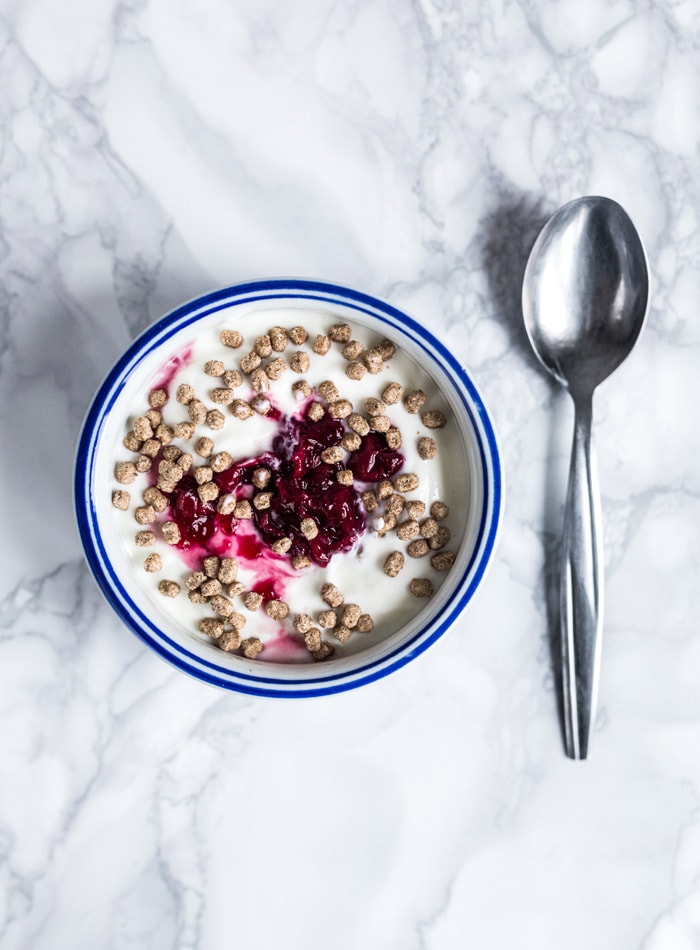
What Controls Hunger
Hunger is primarily controlled by hormones and hormones are affected by what and how much we eat. There are a number of key hormones that affect hunger. Leptin and ghrelin are considered to be the “hunger hormones” but serotonin, dopamine, neuropeptides and glucagon also play a role.
Understanding how ghrelin and leptin work can help us get hunger under control and reduce the frequency and intensity of hunger sensations. Today, we’re just going to look at ghrelin because it’s the bad boy responsible for making you feel so damn hungry all the time.
What is Ghrelin?
First of all, I think ghrelin is an appropriate name for this hunger hormone, don’t you think? It reminds me of gremlin, or some pesky, little monster that lives in our bellies, always freakin’ hungry and demanding that we feed it. Rawr!
Ghrelin is secreted by the stomach and is responsible for causing feelings of hunger, hanger and “I might die and/or kill someone if I don’t eat.” Ghrelin also encourages the body to store fat, particularly around the liver and abdominal area. Just what we’re looking for, right?
Luckily, we can tame hunger by controlling ghrelin levels through food and lifestyle choices. Ghrelin is affected not only by what we eat but by everything from stress to sleep, so approaching nutrition from a total wellness perspective can go a long way.
Again, why am I so hungry all the time?!?
We know that ghrelin is responsible for causing us to feel hungry and that ghrelin levels are affected by our food and lifestyle choices. What is it exactly that we’re doing and eating that’s affecting ghrelin? Let’s look at how we can manage ghrelin, then look at what else can increase hunger.
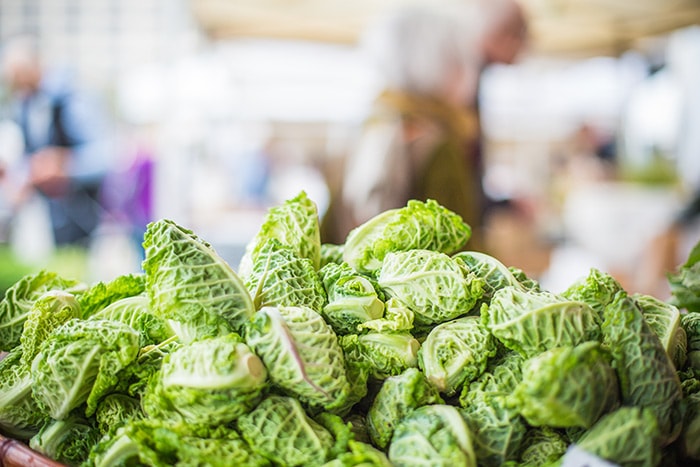
5 Ways to Control Ghrelin Levels
1. Avoid very low-calorie diets. Heavily restricting calories (we’re talking 1000 calories per day or less) increases ghrelin production and abdominal fat storage. Your body is like, hey I’m starving over here! I’m gonna store every little bit of food I get, just in case I need it. This doesn’t mean you can’t reduce body fat through a slow and steady calorie deficit but an extreme restriction of calories is dangerous for both your physical and your mental health.
2. Eat fibre and high-volume foods. When the walls of the stomach experience stretching or pressure from high-volume, fibrous foods, ghrelin production is suppressed. Keeping the belly full of high-volume foods can go along way in managing hunger. I find including a few servings of vegetables at breakfast really helps keep me full throughout the morning. Read more about fiber here.
3. Eat more omega-3s. You can use an omega-3 supplement with EPA and DPA and/or include plenty of foods in your diet that contain them. When we don’t get enough EPA and DHA, it can increase ghrelin production and thereby fat storage around the abdominal area. A diet rich in omega-3 fatty acids has also been shown to boost leptin and reduce inflammation in the body.
4. Support healthy digestion. A healthy gut can help control hunger and body weight. To promote healthy digestion, enjoy fermented foods and beverages, digestion-supporting foods, spices and herbs and consider a probiotic supplement.
5. Eat less fructose. Fructose raises ghrelin levels and suppresses hormones that trigger fullness. This doesn’t mean you can’t eat fruit but you try to avoid processed foods that typically have a high amount of fructose in them, often in the form of high-fructose corn syrup. There’s nothing good in there. Eat real food.
Ghrelin is also affected by stress, exercise and sleep, so always remember that total wellness is key!
Okay, we looked at how we can control ghrelin production but what else has an effect on hunger? Well, there’s one huge factor that not only causes hunger but neglecting to manage it can have a number of negative impacts on the body. Did you guess what it is? Yep, blood sugar!

How Blood Sugar Levels Affect Hunger
Maintaining stable blood sugar is one of the most important jobs the body does for us and we don’t always make it an easy one. We sometimes overeat or eat too much sugar, creating spikes in blood sugar that our body has to scramble to correct. This is tough on the body and is at the root of diabetes, obesity and a number of other health concerns.
Blood Sugar Peaks and Valleys
Hunger is triggered by low blood sugar and this triggering can happen whether you actually need re-fuel or not. If our blood sugar gets too low, our energy levels drop and we experience hunger sensations. Alternatively, high blood sugar can be toxic and dangerous for the body. Big spikes in blood sugar cause big crashes in blood sugar, which causes hunger, leading to overeating and poor food choices. Maintaining stable blood sugar through a healthy diet can go along way in reducing hunger.
What Causes Spikes in Blood Sugar
Well, it’s pretty simple. Eat foods primarily made up of sugar and you’ll experience a spike in blood sugar and consequent crash. High blood sugar can also be caused by overeating. When we overeat, our bodies go into overdrive to deal with an abundance of sugar.
As the body deploys insulin and quickly compensates to bring blood sugar levels back down, we experience low blood sugar shortly after eating. That’s your body sending you a message that you need to bring your blood sugar levels back up ie. hey, I’m hungry, feed me!
When we experience this kind of hunger it’s pretty clear we don’t need to eat again. We just ate. Don’t add fuel to the fire. Let your body deal with the effects of overeating before you give it more to handle.
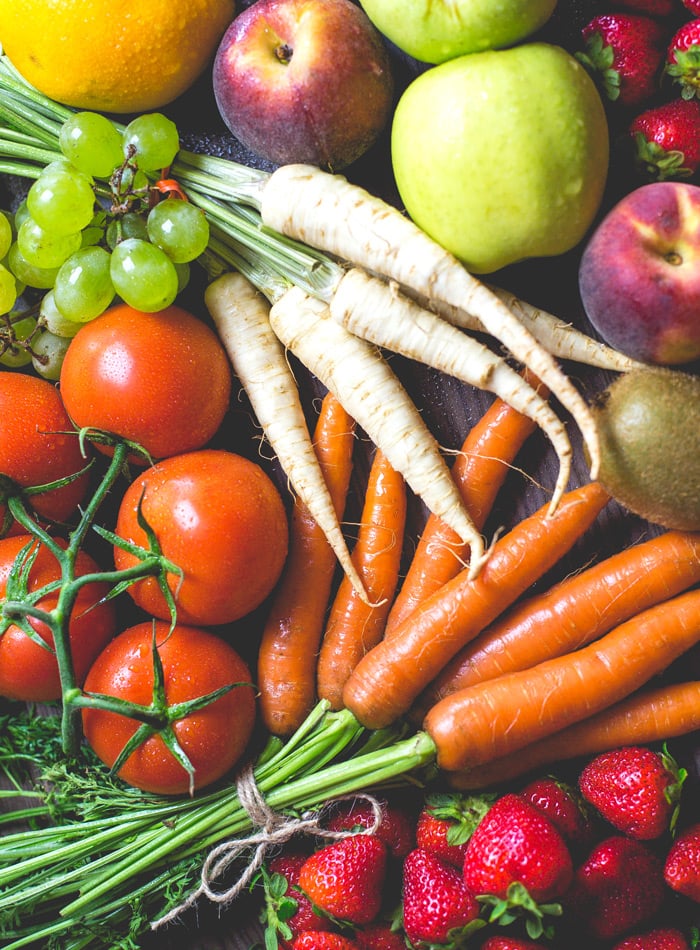
How to Promote Stable Blood Sugar
There are plenty of ways we can assist the body in maintaining stable blood sugar. Blood sugar levels are always going to go up and down but the key is preventing big peaks and valleys. Eat a bunch of sugar on an empty stomach, spike your blood sugar, the body compensates, crashing blood sugar levels, the body sends you a hunger message, you eat again, the cycle continues.
You don’t need to immediately react to that hunger!
Ideally, we’d prevent these blood sugar spikes in the first place. Let’s look at a few ways we can help promote stable blood sugar levels.
10 Ways to Balance Blood Sugar
1. Include healthy fats at every meal. Fats have the lowest impact on blood sugar levels and help increase satiety by slowing down the absorption of glucose into the bloodstream. Get those avocados and nuts into your diet!
2. Eat enough protein. Compared to carbohydrates, protein is digested more slowly and when it’s consumed on its own, it doesn’t create the spike in blood sugar that carbs do. Remember, low-sugar protein powder and bars are okay to help supplement protein but it’s important to include whole food protein sources in your diet.
3. Eat a balance macronutrients at each meal to help slow down the digestive process. Carbohydrates are essential and typically make up somewhere between 40 and 60% of a healthy diet. The key is to include a balance of carbohydrates, fats and protein with every meal to help slow down their digestion and keep you full. That being said, sometimes we want quick digesting carbohydrates, for example, when we’re weightlifting or performing high-intensity exercise but we’ll look at that another day!
4. Eat more non-starchy vegetables. These high-volume, fibrous veggies are digested more slowly than starchy vegetables and have a low impact on blood sugar.
5. Avoid alcohol. Alcohol can cause an immediate rise in blood sugar and then a large drop a few hours later. If you do consume alcohol, do so in moderation and with some food in your stomach.
6. Include fibre with every meal. Similarly to fat and protein, fiber can help to promote satiety and help slow digestion, preventing spikes in blood sugar. Fiber also provides a range of other health benefits and is a very important part of a healthy diet. Read more about the best sources of fiber.
7. Excercise. Exercising on a consistent basis lowers your blood glucose and helps keep blood sugar levels stable.
8. Start the day with a balanced, higher protein meal. Even though I love oatmeal and smoothies at breakfast, it’s important to include a balance of fats and protein. A good choice for vegans and vegetarians is a non-starchy vegetable scramble with tempeh or quinoa porridge with nuts and hemp seeds.
9. Don’t skip meals. Eat balanced meals and snacks every 3-4 hours or so to help keep blood sugar stable and prevent overeating.
10. Eat ceylon, or true cinnamon. True cinnamon has been shown to help balance blood sugar levels. Try mixing it into tea or coffee, using it in baking and other recipes, sprinkling it on hot and cold cereal and even using it to spice curries. There are a number of benefits to including ceylon over regular cinnamon in your diet, so while it’s a bit of a splurge, if you can get your hands on some, I think it’s worth it.

Lifestyle Choices Affecting Hunger and Blood Sugar
Stress, exercise, dehydration and sleep all play a roll in hunger.
Stress Management
Not managing our stress levels can cause cortisol levels to remain high in the body, effectively increasing our appetite. We’ve all been there. Stress eating, emotional eating, whatever you want to call it. High-stress levels can affect our appetite, which is a psychological drive that causes us to crave particular foods, not to be mixed up with real hunger. Mindful eating and bringing awareness to times you overeat can distinguish between appetite and true hunger. A food journal is often helpful in this case!
Exercise, Hydration and Sleep
As for exercise, daily movement promotes a healthy metabolism, proper digestion, helps to manage stress and of course, has a wide range of other health benefits. Do it. Every day!
Dehydration is huge too, and you’ve probably heard it 100 times. Drink more water! As for sleeping, a lack of quality sleep may have a direct effect on how hungry we feel. Sleep duration has been found to reduce levels of leptin, an appetite suppressing hormone and increase levels of ghrelin, stimulating hunger. Not only that, a lack of quality sleep affects mood, recovery, memory, blood sugar and energy levels. I’ll be talking about my routine for a great night’s sleep in an upcoming post. Don’t miss it!
Now What?
Alright! That was really fun to chat about. We talked all about ghrelin, how to manage it to control hunger and what we can do to promote stable blood sugar. Where to go from here….
Knowledge is Power
When it comes to nutrition and fat loss, knowledge is power. Arm yourself with the tools you need to succeed. Read, listen to podcasts, surround yourself with people who share similar goals and that you can learn from.
The more we understand about our bodies and how powerful the food we eat is, the easier it becomes to consistently make quality food choices. That chocolate chip muffin might not be as appealing when you know it will cause a spike in blood sugar, causing you to crash and leaving you feeling hungry shortly after eating it, creating an endless cycle.
Where to Start
If that all seems overwhelming to you, don’t worry about it! Pick one thing to focus on. Maybe you start by including one omega-3 rich food in your diet every day. Or maybe instead of a whole chocolate chip muffin, you eat half alongside a big tofu and vegetable scramble. Maybe you focus on getting to bed an hour earlier this week.
Improvement over perfection, guys. It’s a lifelong journey and it isn’t a linear one! These aren’t the rules and they certainly aren’t set in stone. Sometimes we’re going to eat the damn (vegan) donut. These are simply some steps you can take to help get a hold of your hunger. One step of a time, you don’t have to do all these things at once. Perfection only sets us up for failure. Consistency and steady improvement are the golden tickets.
It’s never to late to educate yourself, improve your diet and keep striving towards your best self. When we feel good, feel comfortable in our skin and have plenty of energy, everything in life gets easier, so keep after it, guys!
Strive to be the best version of yourself, at any given time, with what you have.
More Reading
Disclaimer: Before starting any new diet and exercise program please check with your doctor and clear any exercise and/or diet changes with them before beginning. I am not a doctor or registered dietitian. I do not claim to cure any cause, condition or disease. I do not provide medical aid or nutrition for the purpose of health or disease and claim to be a doctor or dietitian.

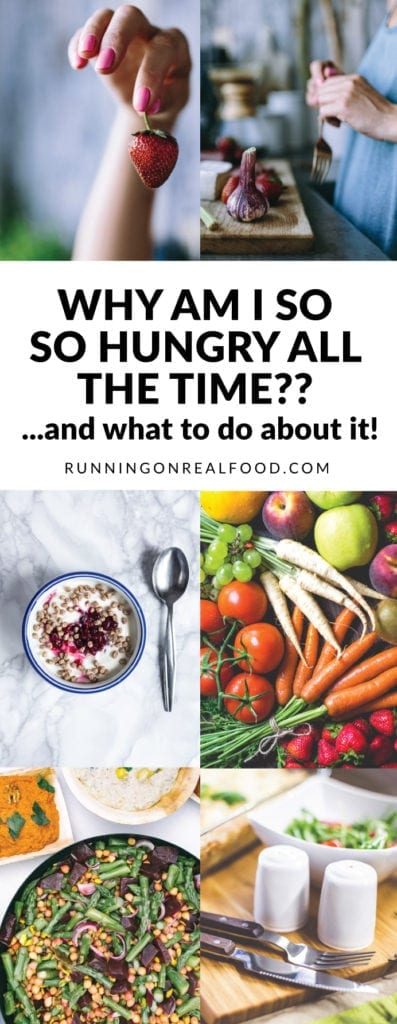




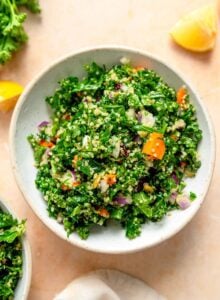
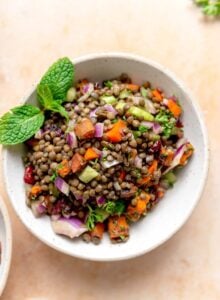
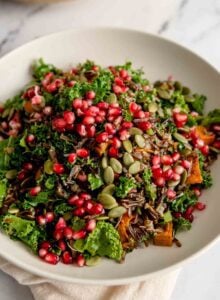
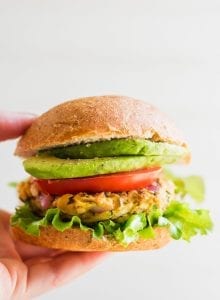
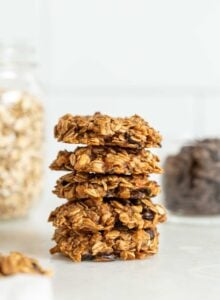




This had helped me a lot. Thank you for this wonderful post!!! <3
Very helpful article. I used to ask myself the same question all the time until my nutritionist made some recommendations glad i found professional help.
Thank you so much for this post!. I just stubble upon it tonight while browsing your blog. It couldn’t have come at a better time. I had just eaten a large meal in honor of my sisters B-day, and I was hungry 2 hours later! Thank you for explaining blood sugar spikes and falls, it makes it so much easier to manage hunger when you know why it is happening.
Thank You, Thank You, Thank You!!!!!!
I’m so happy you found it helpful, Kristi! All the best. Thanks for the comment!
I think you nailed it with the hyrdration factor many of us do not get what we need and that is why we are always wanting to eat more
You have NO IDEA how much I needed this post. THANK YOU!
I’m SO very happy you found it helpful. Thanks for your comment!
Thanks! Really good explained.
Would Love to read more about what food that you recommend as good fats, fiber, proteins and so on. It’s sometimes hard to know what to choose when your in the store. Thanks for the inspiration. Now I got some energy to start Channing my food habits. / erika
Erika –
Great question! Some really good fats consist of Avocados , Pumpkin Seeds , Coconuts , anythings usually grassfed . There is also this fruit called Durian , from Singapore that’s literally filled with tons of good fat and it’s tasty as well. Hope this helps